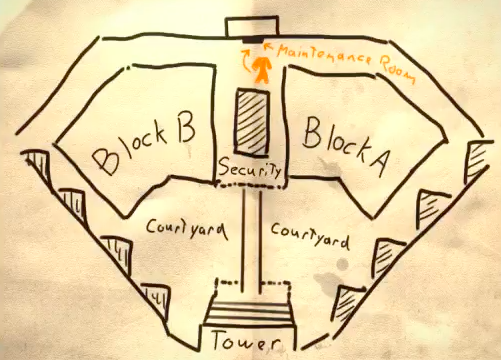
Kenneth Chen
Digital Media PhD Student
Kenneth is a doctoral student in the Digital Media PhD program. In his series “Kenneth on Games” he writes about his passion for games and game design.

In my previous essay on Deus Ex: Mankind Divided, I talked about how the reboot series will rarely force players to go through a combat area that they had previously completed, in order to maintain the illusion of having many choices. The latest DLC, A Criminal Past, goes against this hypothesis. You start in block A of a prison complex and must make your way to block B, which is nearly identical. Why would they break their previously established pattern?
Narrative Context for Factory Zero Runs
A Criminal Past starts with Adam Jensen going undercover as a prisoner in an aug-only prison where they upload a virus that disables their augs. Naturally, since it’s Deus Ex, the player expects that they will be able to get their augs back at some point. They start out in a prison cell feeling disempowered, with nothing to do until the wardens open his cell for his daily yard time. Even though the player has no real agency, it’s okay because they’re in a prison: they’re not supposed to have agency.
The layout from Jensen’s cell (on the top floor) to the yard (on the bottom floor) is designed to make Jensen go through block A to get to his destination. There really isn’t much to see, but the player subconsciously remembers the layout, such as pillars that Jensen can hide behind or the location of the security room.
Once the player enters the yard, they encounter a doctor who offers them a pill that will restore their augs. Immediately, this throws the player’s expectations in a loop: they thought that they would 100% have their augs back, just like they did in The Missing Link in Human Revolution. Usually, a player must intentionally aim for a “factory zero” run, meaning that they avoid using augs not for any narrative purpose but just for the sake of challenge. Here, the fact that the doctor offers you a choice, means that a factory zero run has an impact and can change how the story pans out.
This also presents a unique problem: the designers must ensure that both factory zero runs and aug-enabled runs are both fun. Certainly, it will be more difficult without augs, but the difference must not be drastically unbalanced. By acknowledging the possibility of a factory zero run, they’re saying that this is not something restricted to hardcore masochists.
After the player decides whether or not to take the doctor’s pill, they are asked with sneaking into block B to talk to their next contact. The fact that the player remembers how a prison block is arranged does two things to normalize the difference between a factory zero run and an aug run. First, it acts as an external source of intelligence, which is very valuable. Second, it presents this intelligence equally to everyone. Sometimes, intelligence is placed in locations that are too difficult for augless players to approach, such as a note that can only be found inside a staffed security room.
If block B had been arranged in a drastically different fashion, it would follow the standard level design progression that Deus Ex is known for. But that progression only works because the designers assume that you have augs and you can use things such as smart vision or hacking to increase your intelligence. By making the two blocks identical, the designers make the encounter a little repetitive, but in exchange they provide a subtle but significant amount of support for factory zero runs.
Tunneling and a Lack of Agency

In block B, your objective is to reach the shower room. The only way there is to get to the bottom level and sneak past a group of guards investigating a broken drone. To say that there is an “only way there” seems like it would go against everything Deus Ex is known for, and in many ways, it is. It feels like a sequence that belongs in Escape from Butcher Bay.
But this linearity is intentional. Normally, alternate paths are unlocked through specific augs (breaking through walls to clear a new path, moving a heavy object so you can climb it and jump up to a higher ledge). However, there are no alternate paths on the last floor of block B, so aug players must confront the same situation that factory zero players do.
The Deus Ex reboot series mostly takes what I call a “wide but shallow” approach to branching paths in level design. There are many ways to approach a situation, but each of those ways is executed in a very simple way, usually being a “do you have this aug” check. However, the block B encounter is “narrow but knee-deep,” where there is only one path no matter what augs you have, but the amount of intel you have changes how you approach the situation. And all players have nearly the same amount of intel because the two cell blocks are identical.
In the narrative context, this makes sense because you are still in a prison and you should be feeling disempowered. This narrative context acts as a good way to ensure that the design context works, which is to normalize the experience between factory zero runs and aug runs. All of this only works in the introductory segment, because as the game goes on, factory zero players are going to slowly develop their limited abilities and desire greater levels of challenge, whereas aug players are going to want enough space to flex their muscles and live the super-cyborg fantasy.
As the game goes on, certain decisions will make the game easier or harder depending on whether you took the pill. For example, you can find a modified biocell which will restore access to your augs, but it’s also being delivered to a specific person. If you make the delivery, it turns out that he uses it to incite a prison riot, and your fellow prisoners take over a nearby building. They’re friendly to you because you’re a prisoner as well.
On the other hand, if you hadn’t made the delivery (and presumably used the biocell on yourself), you would have to fight off guards and drones as you progress through that same building, but you would have enough power to make it possible. Each of these paths still carries the same general theme of “augless runs get a helping hand.”
As the game continues, the levels expand to offer the multiple pathways that Deus Ex is known for. The developers try to add little tricks and tools for factory zero players, but eventually the difficulty curves too far and it becomes ridiculously hard. This is okay: factory zero runs are supposed to be hard. There have also been plenty of opportunities for players to regain use of their augs even if they initially refused the doctor’s pill, as a way for players to adjust the difficulty curve mid-game.
Funnily enough, the best ending can only be achieved through liberal use of augs. It seems strange to me that the hardest path doesn’t result in the best ending. But on the other hand, is the factory zero run actually the hardest path? Perhaps the game adjusts its difficulty so much that a factory zero run is just as hard as a normal one, or possibly even easier, as counterintuitive as it may seem.
As the last DLC, it will probably be a while until we see anything else from the Deus Ex universe again. A Criminal Past is designed to ease players into the experience of a factory zero run: all the personal tension of being augless, combined with subtle difficulty adjustments to ensure it’s not overwhelming. These things may inspire players to go back to the base campaign and try a factory zero run there, after getting a small taste in the DLC.
